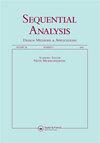纯顺序的FWCI和MRPE问题的平均正常人群的抽样与插图组使用乳腺癌数据
IF 0.6
4区 数学
Q4 STATISTICS & PROBABILITY
Sequential Analysis-Design Methods and Applications
Pub Date : 2020-04-02
DOI:10.1080/07474946.2020.1766893
引用次数: 5
摘要
摘要在估计具有未知方差的正态总体的未知均值(μ)的情况下,重新研究了纯序列估计的两个基本问题——(i)固定宽度置信区间(FWCI)估计问题和(ii)最小风险点估计问题。我们首先为这两个问题的二阶渐近分析,在一次一个观测值的顺序抽样下,建立一般框架。然后,在定义我们提出的估计策略时,我们考虑一次顺序采样k个观测值,而不是一次收集一个观测值。我们用一些其他相关的估计量来代替习惯的样本标准差作为σ的估计量,以提出新的和更合适的停止规则来适应这种情况。我们这样做是因为在现实生活中,我们知道批量购买的包装商品的单位样品成本通常低于单个商品的成本。本文构建了整个估计方法阵列,以便通过适当的一阶和二阶渐近分析来解决FWCI和MRPE问题。随后是通过大规模计算机模拟辅助的大量精心布置的数据分析。这些都附有使用乳腺癌数据的插图。本文章由计算机程序翻译,如有差异,请以英文原文为准。
Purely sequential FWCI and MRPE problems for the mean of a normal population by sampling in groups with illustrations using breast cancer data
Abstract Two fundamental problems on purely sequential estimation are revisited—(i) the fixed-width confidence interval (FWCI) estimation problem and (ii) the minimum risk point estimation (MRPE) problem—in the context of estimating an unknown mean (μ) in a normal population having an unknown variance ( ). We begin by laying down general frameworks for the second-order asymptotic analyses, in both problems, under sequential sampling of one observation at a time. Then, instead of gathering one observation at a time, we consider sequentially sampling k observations at a time in defining our proposed estimation strategies. We replace the customary sample standard deviation as an estimator for σ with a number of other pertinent estimators to come up with new and more appropriate stopping rules to suit the occasion. We do so because in real life we know that packaged items purchased in bulk often cost less per unit sample than the cost of an individual item. This article builds the whole array of estimation methodologies in order to address both FWCI and MRPE problems with appropriate first-order and second-order asymptotic analyses. These are followed by extensive sets of carefully laid out data analyses assisted via large-scale computer simulations. These are wrapped up with illustrations using breast cancer data.
求助全文
通过发布文献求助,成功后即可免费获取论文全文。
去求助
来源期刊

Sequential Analysis-Design Methods and Applications
STATISTICS & PROBABILITY-
CiteScore
1.40
自引率
12.50%
发文量
20
期刊介绍:
The purpose of Sequential Analysis is to contribute to theoretical and applied aspects of sequential methodologies in all areas of statistical science. Published papers highlight the development of new and important sequential approaches.
Interdisciplinary articles that emphasize the methodology of practical value to applied researchers and statistical consultants are highly encouraged. Papers that cover contemporary areas of applications including animal abundance, bioequivalence, communication science, computer simulations, data mining, directional data, disease mapping, environmental sampling, genome, imaging, microarrays, networking, parallel processing, pest management, sonar detection, spatial statistics, tracking, and engineering are deemed especially important. Of particular value are expository review articles that critically synthesize broad-based statistical issues. Papers on case-studies are also considered. All papers are refereed.
 求助内容:
求助内容: 应助结果提醒方式:
应助结果提醒方式:


